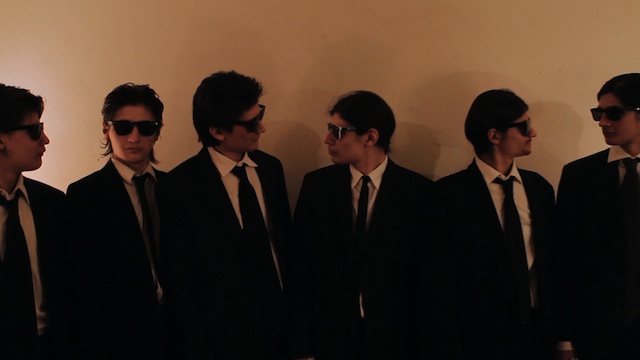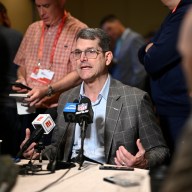‘The Wolfpack’ All we know when “The Wolfpack” begins is that its teenage subjects — six boys living in an LES high-rise — really like Quentin Tarantino. We soon find out they’re also really into Christopher Nolan. Like many cinephiles, they channel their passion into acting out scenes from “Pulp Fiction,” “Reservoir Dogs” and the latest round of “Batman” films. But they take it further: They dress up, doing semi-formal recreations where they try to mimic every move and line inflection to the T. So far so super nerdy, though there’s also this pesky fact: their parents, for the most part, have long forbidden them from going outside. Some years they’ll hit the streets only once. Other years they won’t do it at all. “The Wolfpack” sets us up to be alarmed: at teens who live under the command of wildly overprotective, maybe dangerous parents; at boys who, more than most, know nothing about the outside world apart from what they’ve gleaned from movies — and not just movies but violent, bleak movies about hitmen and rich vigilantes. The remainder goes about showing us that it’s both not as bad as we may think and, perhaps, in certain aspects, far worse than we think. At first their movie obsession seems worrisome. Eventually it becomes clear that, as a lifeline to humanity, movies — windows into other worlds and cultures and ideas — aren’t a bad way to go. Even their habit of recreating what they love is the first step to stoking artistic sensibilities. In a sense, they’re almost better than teens who are imprisoned by smartphones. On the other hand, they’re still mostly stuck in a cavernous apartment. Mom, who we’re told is their teacher, seems genuinely loving but vaguely damaged in some way; when we learn late in that her own mother has no idea she has over half a dozen kids (a seventh, a mentally disabled daughter, stays off-screen) it doesn’t seem too surprising. Dad, meanwhile, mostly hides in the background, his absence stoking the viewer’s imagination. He seems like a cult leader who never was, and it’s a relief when we discover his power has, by the time documentarian Crystal Moselle and her camera arrive, mostly vanished. Some boys haven’t spoken to him in ages, which is a relief — minus the intimation that he’s done things that have forced estrangement at all. Moselle’s film walks a fine line engagement and distance. There’s a sense that she doesn’t want to pry, that she’ll only show and delve into what they want us to know. The absences only make us imagine more than we’re shown, and make it a more disquieting film, perhaps more than it should be. It wants to both stew in their world and hint at what lies beyond its boundaries. And viewers are really allowed to stew. Apart from the second half, which is littered with a handful of major developments, the structure betrays no clear timeline. Life is a mobius strip of movies, movie recreations and uncomfortable dealings with dad, where time doesn’t exist and the years fly by. Moselle shot over five years, and soon enough, gradually, bit by bit, life does start moving on. Eventually the boys start escaping — at first for brief stints (one prowls the streets in a Michael Myers mask before worrying police), then for longer missions (to the AMC Village 7 and Coney Island), then, it seems, for good. When some by the end wind up with jobs, conversing easily with others (about binging “Breaking Bad,” but what’s more relatable?) the sense that things might definitely be on the road for the good, rather than teetering on the edge, is immeasurably soothing. It’s like a “Grey Gardens” that ends with Edie hitting an apple farm, going to the beach, making friends and hungry to experience a life not yet lived, though unable to shake all that came before. In its gentle, intimate, sometimes goofy way, “The Wolfpack” is a grueling experience.
Director: Crystal Moselle
Genre: Documentary
Rating: NR
4 (out of 5) Globes
‘The Wolfpack’ is both a happier and grimmer ‘Grey Gardens’

Magnolia Pictures
Follow Matt Prigge on Twitter @mattprigge

















